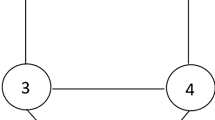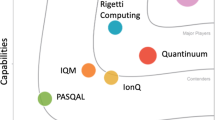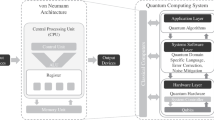Abstract
We describe a possible physical device that computes a function that cannot be computed by a Turing machine. The device is physical in the sense that it is compatible with General Relativity. We discuss some objections, focusing on those which deny that the device is either a computer or computes a function that is not Turing computable. Finally, we argue that the existence of the device does not refute the Church–Turing thesis, but nevertheless may be a counterexample to Gandy's thesis.
Similar content being viewed by others
References
Church A. (1936a), 'An Unsolvable Problem of Elementary Number Theory', American Journal of Mathematics 58, pp. 345–363. Reprinted in Davis (1965), pp. 88- 107.
Church A. (1936b), 'A Note on the Entscheidungsproblem', Journal of Symbolic Logic 1, pp. 40–41. Reprinted in Davis (1965), pp. 108- 115.
Cleland C. (1993), 'Is the Church- Turing Thesis True?' Minds and Machines 3, pp. 283–312.
Copeland B.J. (1996), 'The Church- Turing Thesis', in Perry J. and Zalta E., eds., Stanford Encyclopedia of Philosophy [http://plato.stanford.edu].
Copeland B.J. (2002), 'Accelerating Turing Machines', Minds and Machines 12, pp. 281–301.
Copeland B.J. and Sylvan R. (1999), 'Beyond the Universal Turing Machine', Australasian Journal of Philosophy 77, pp. 46–67.
Davis M. (ed.) (1965), The Undecidable: Basic Papers on Undecidable Propositions, Unsolvable Problems and Computable Functions,NewYork: Raven.
Earman J. (1986), A Primer of Determinism, Holland: Reidel.
Earman J. and Norton J.D. (1993), 'Forever is A Day: Supertasks in Pitowsky and Malament-Hogarth Spacetimes', Philosophy of Science 60, pp. 22–42.
Gandy R.O. (1980), 'Church's Thesis and Principles of Mechanisms', in Barwise J., Keisler J.J. and Kunen K., eds., The Kleene Symposium, Amsterdam: North-Holland, pp. 123–145.
Gandy R.O. (1988), 'The Confluence of Ideas in 1936', in Herken (1988), pp. 55–111.
Gödel K. (1931), 'On Formally Undecidable Propositions of Principia Mathematica and Related Systems I', Monatshefte für Mathematik und Physik 38, pp. 173–198. Translated and Reprinted in Davis (1965), pp. 5- 38.
Goldstine H.H. (1972), The Computer from Pascal to Von Neumann, Princeton: Princeton University Press.
Herken R. (ed.) (1988), The Universal Turing Machine A Half-Century Survey, Oxford: Oxford University Press
Hilbert D. and Ackermann W. (1928), Grundzuge der Theoretischen Logic, Berlin: Springer-Verlag.
Hodges A. (1983), Alan Turing: The Enigma, New York: Touchstone, Simon and Schuster.
Hogarth M.L. (1992), 'Does General Relativity Allow an Observer to View an Eternity in a Finite Time?', Foundations of Physics Letters 5, pp. 173–181.
Hogarth M.L. (1994), 'Non-Turing Computers and Non-Turing Computability', Proceedings of the Philosophy of Science Association (PSA) 1, pp. 126–138.
Kleene S.C. (1936), 'General Recursive Functions of Natural Numbers', Mathematische Annalen 112, pp. 727–742. Reprinted in Davis (1965), pp. 236- 253.
Kleene S.C. (1988), 'Turing's Analysis of Computability, and Major Applications of It', in Herken (1988), pp. 17–54.
Laraudogoitia J.P. (1999), 'Supertasks', in Perry J. and Zalta E., eds., Stanford Encyclopedia of Philosophy [http://plato.stanford.edu].
Moore C. (1990), 'Unpredictability and Undecidability in Dynamical Systems', Physical Review Letters 64, pp. 2354–2357.
Penrose R. (1994), Shadows of the Mind, New York and Oxford: Oxford University Press.
Pitowsky I. (1990), 'The Physical Church Thesis and Physical Computational Complexity', Iyyun 39, pp. 81–99.
Pitowsky I. (1996), 'Laplace's Demon Consults an Oracle: The Computational Complexity of Prediction', Studies in History and Philosophy of Physics 27, pp. 161–180.
Post E.L. (1936), 'Finitary Combinatory Processes - Formulation I', Journal of Symbolic Logic 1, pp. 103–105. Reprinted in Davis (1965), pp. 288- 291.
Pour-El M.B. and Richards I. (1981), 'The Wave Equation with Computable Initial Data such that its Unique Solution is not Computable', Advances in Mathematics 39, pp. 215–239.
Shagrir O. (1997), 'Two Dogmas of Computationalism', Minds and Machines 7, pp. 321–344.
Shapiro S. (1983), 'Remarks on the Development of Computability', History and Philosophy of Logic 4, pp. 203–220.
Sieg W. (1994), 'Mechanical Procedures and Mathematical Experience', in George A., ed., Mathematics and Mind, Oxford: Oxford University Press.
Sieg W. and Byrnes J. (1999), 'An Abstract Model for Parallel Computations: Gandy's Thesis', The Monist 82, pp. 150–164.
Siegelmann H.T. (1995), 'Computation Beyond Turing Limit', Science 268, pp. 545–548.
Turing A.M. (1936), 'On Computable Numbers, with an Application to the Entscheidungsproblem', Proceedings of the London Mathematical Society (2) 42, pp. 230–265. A correction in 43 (1937), pp. 544- 546. Reprinted in Davis (1965), pp. 115- 154.
Turing A.M. (1939), 'Systems of Logic Based on Ordinals', Proceedings of the London Mathematical Society 45(2), pp. 161–228. Reprinted in Davis (1965), pp. 154- 222
Wald R.M. (1984), General Relativity, Chicago: University of Chicago Press.
Wolfarm S. (1985), 'Undecidability and Intractability in Theoretical Physics', Physical Review Letters 54, pp. 735–738.
Author information
Authors and Affiliations
Rights and permissions
About this article
Cite this article
Shagrir, O., Pitowsky, I. Physical Hypercomputation and the Church–Turing Thesis. Minds and Machines 13, 87–101 (2003). https://doi.org/10.1023/A:1021365222692
Issue Date:
DOI: https://doi.org/10.1023/A:1021365222692




